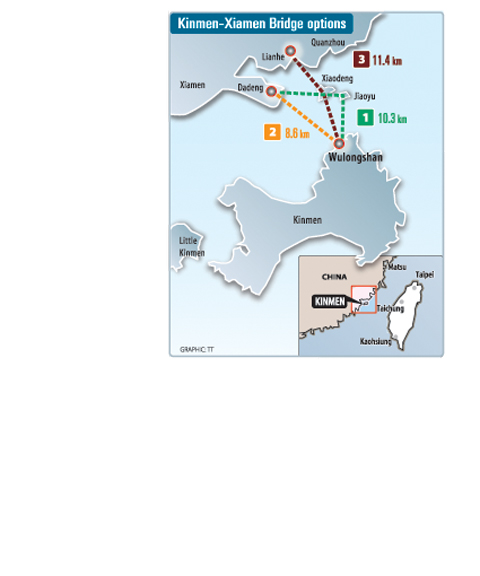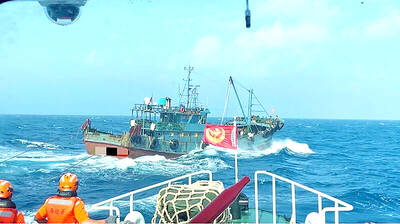The Presidential Office yesterday said President Ma Ying-jeou (馬英九) had asked about the progress of a plan to build a bridge connecting Kinmen with China’s Xiamen, but had not given instructions for its construction.
Presidential Office Spokesman Wang Yu-chi (王郁琦) told a press conference that “there was a gap between the media report and the truth.”
Wang made the remarks in response to media inquiries about a report in the Chinese-language United Daily News yesterday.

The report said Ma asked the Council for Economic Planning and Development (CEPD) to expedite the study of a construction project and to present the evaluation report as soon as possible.
The paper said Executive Yuan Secretary-General Hsueh Hsiang-chuan (薛香川) had promised Ma that the Executive Yuan would speed up the process and brief the president at an appropriate time.
The United Daily News reported that the CEPD had said it would complete the evaluation and send it to the Executive Yuan for review by the end of the month.
Wang said that during Ma’s inspection trip to Kinmen on Aug. 24 last year, the president told local residents that there should not be any technical problem building the Kindeng Bridge (金嶝大橋), but that he would like them to consider its political implication and effectiveness.
Ma then asked the CEPD to complete the assessment by the end of last year, Wang said. When Ma had dinner with Hsueh and other staffers at the Taipei Guest House on Wednesday evening, Wang said Ma inquired about the progress of the evaluation report.
“The president did not instruct the Executive Yuan to build the bridge,” Wang said yesterday.
When asked whether Ma supported the construction of the bridge, Wang said it would depend on the result of the assessment report.
At a separate setting, Cabinet Spokesman Su Jun-pin (蘇俊賓) said the CEPD was still evaluating the possibility of building the bridge and that the Executive Yuan did not have any particular opinions regarding the issue.
The government would only support policies that would benefit the country, he said.
Mainland Affairs Council Deputy Minister Liu Te-shun (劉德勳) yesterday said that convenience should not be the only factor considered for the construction of the bridge, because both sides of the Strait have sign ed agreements to launch direct air and sea transportation links.
“The matter also concerns the economy and living environment,” he said. “We think such a project should be carefully assessed by the CEPD.”
Liu said his understanding was that the bridge could cost NT$10 billion (US$297 million) to build.
When asked for comment, KMT Legislator Shuai Hua-ming (帥化民), a member of the legislature’s Foreign and National Defense Committee, said a bridge could become a symbol of cross-strait peace.
“Under the rule of Chiang Kai-shek (蔣介石) and Chiang Ching-kuo (蔣經國), [Kinmen] was an important military site because we were planning to retake China,” Shuai said. “But we are no longer planning to retake China ... this [bridge] could be seen as an important development of cross-strait reconciliation.”
Other legislators, however, were worried that construction of the bridge would lead to Taiwanese taxpayers’ money being spent on helping China develop Xiamen.
ADDITIONAL REPORTING BY FLORA WANG

POLITICAL AGENDA: Beijing’s cross-strait Mid-Autumn Festival events are part of a ‘cultural united front’ aimed at promoting unification with Taiwan, academics said Local authorities in China have been inviting Taiwanese to participate in cross-strait Mid-Autumn Festival celebrations centered around ideals of “family and nation,” a move Taiwanese academics said politicizes the holiday to promote the idea of “one family” across the Taiwan Strait. Sources said that China’s Fujian Provincial Government is organizing about 20 cross-strait-themed events in cities including Quanzhou, Nanping, Sanming and Zhangzhou. In Zhangzhou, a festival scheduled for Wednesday is to showcase Minnan-language songs and budaixi (布袋戲) glove puppetry to highlight cultural similarities between Taiwan and the region. Elsewhere, Jiangsu Province is hosting more than 10 similar celebrations in Taizhou, Changzhou, Suzhou,

COGNITIVE WARFARE: Chinese fishing boats transmitting fake identification signals are meant to test Taiwan’s responses to different kinds of perceived incursions, a report said Chinese vessels are transmitting fake signals in Taiwan’s waters as a form of cognitive warfare, testing Taipei’s responses to various types of incursions, a report by the Institute for the Study of War said on Friday. Several Chinese fishing vessels transmitted fake automatic identification system (AIS) signals in Taiwan’s waters last month, with one mimicking a Russian warship and another impersonating a Chinese law enforcement vessel, the report said. Citing data from Starboard Maritime Intelligence, the report said that throughout August and last month, the Chinese fishing boat Minshiyu 06718 (閩獅漁06718) sailed through the Taiwan Strait while intermittently transmitting its own AIS

The Republic of China (ROC) is celebrating its 114th Double Ten National Day today, featuring military parades and a variety of performances and speeches in front of the Presidential Office in Taipei. The Taiwan Taiko Association opened the celebrations with a 100-drummer performance, including young percussionists. As per tradition, an air force Mirage 2000 fighter jet flew over the Presidential Office as a part of the performance. The Honor Guards of the ROC and its marching band also heralded in a military parade. Students from Taichung's Shin Min High School then followed with a colorful performance using floral imagery to represent Taiwan's alternate name

CHINESE INFILTRATION: Medical logistics is a lifeline during wartime and the reported CCP links of a major logistics company present a national security threat, an expert said The government would bolster its security check system to prevent China from infiltrating the nation’s medical cold chain, a national security official said yesterday. The official, who wished to stay anonymous, made the remarks after the Chinese-language magazine Mirror Media (鏡周刊) reported that Pharma Logistics (嘉里醫藥物流) is in charge of the medical logistics of about half of the nation’s major hospitals, including National Taiwan University Hospital and Taipei Veterans General Hospital. The company’s parent, Kerry TJ Logistics Co (嘉里大榮物流), is associated with the National Committee of the Chinese People’s Political Consultative Conference (CPPCC) and the Chinese People’s Liberation Army (PLA), the